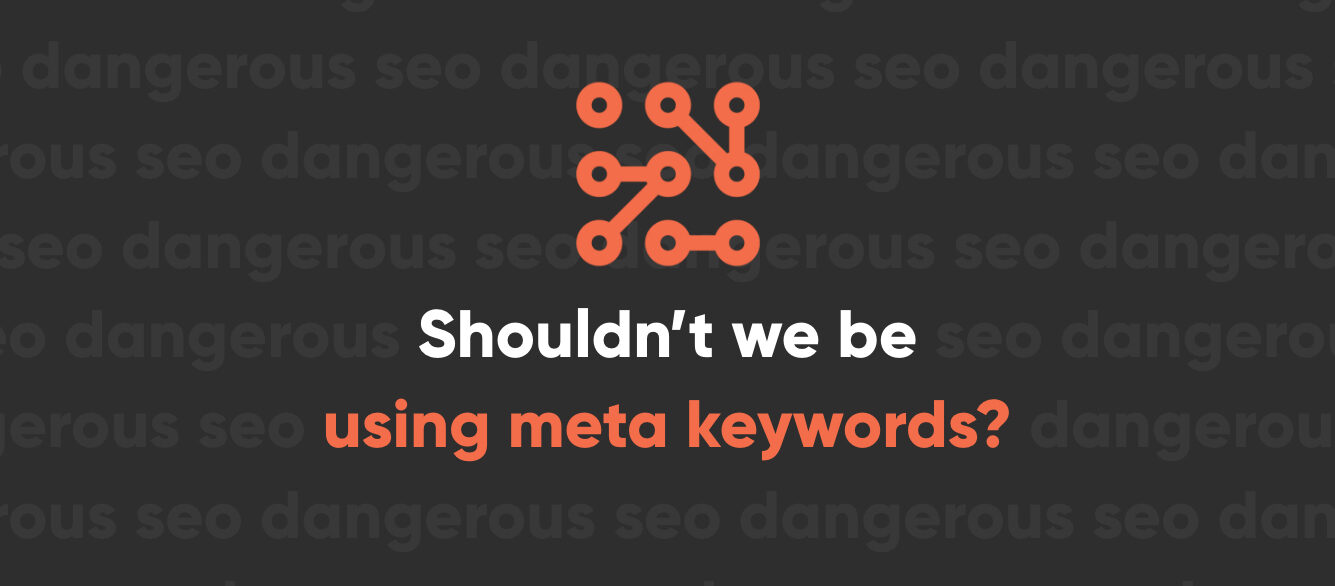
Shouldn’t We Be Using Meta Keywords? – Internet Marketing Mysteries

Back in the good ol’ days of SEO, meta keywords were where it was at. You just shoved in every keyword you could ever imagine wanting to rank for, and then you sat back while the SEO magic happened.
Well, in case you haven’t heard, meta keywords are long dead. In fact, using them can actually hurt you. Still, it’s a common question: "Shouldn’t we be using meta keywords?"
What Exactly Are Meta Keywords?
Meta keywords refers to a meta tag you can use in the HTML code of your site. In theory, you would use this tag to provide the search engines with more information regarding what your page is about. The search engines would then read the keywords in the tag and say, "Oh, that’s what you want to rank for. Okay, let’s move this site to the top!"
And it did work, back in the day when the search engines weren’t as wise to the games people play (and when they didn’t have advanced algorithms that could detect much more useful ranking signals). The problem was that it was just too easy to spam the system through keyword stuffing, the practice of jamming every relevant, semi-relevant, and irrelevant keyword you can think of in order to try to bring more traffic to your site.
As a web design, web development, and internet marketing company, our meta keywords tag could look something like this:
Do you see any potential problems if everyone did that?
Why Meta Keywords Became Irreverent
It’s not much of a secret as to why the search engines stopped paying attention to meta keywords. This was one of many efforts to combat web spam and clean up the search results. When anyone and everyone could rank for something just by shoving it into a meta tag, it became pretty obvious that there was a problem. The search results would be flooded by sites that just weren’t that relevant to the query.
Google took action first. In 2009, the search engine officially announced that it does not use the meta keywords tag as a ranking factor (although they actually had stopped using it many years prior). Could they have changed their mind since then? Well, probably not. It wouldn’t make any sense for Google, in its endless quest to battle web spam and provide better search results, to start allowing this again. Just imagine Matt Cutts saying, "Hey, I think we should start using the meta keywords tag again. Surely people have stopped all that keyword stuffing by now." Yeah, right. Old habits die hard, and spammers will always fill the meta keywords tag with every word they can think of.
As far as Google is concerned, you can use the meta keywords tag all you want. It doesn’t hurt anything (or so they say). They don’t even look at it (or so they say). Yahoo is the same way. But Bing isn’t quite so nice about it. Bing actually does look at the tag, but they don’t use it as a ranking factor. No, Bing uses it only as a penalty factor. If you’re caught spamming your meta keywords tag with words that don’t appear in your content, then your Bing rankings will suffer. More on that in a moment.
But So-And-So Says We Should Still Use It
There are plenty of SEO professionals who still believe in the meta keywords tag, and they aren’t all hacks or spammers. Plenty of legitimate SEO companies continue to plug keywords into the tag (albeit, mostly just relevant keywords). A very respectable marketing tool even published a blog post last year saying you should use them. Their reasoning? Because a lot of search marketers still do it. When in Rome, right?
Wrong. No matter how many people still use it, there is no value to putting the tag on your web pages. In October of 2014, Bing’s Duane Forrester shared his own feelings about the worthlessness of the meta keywords tag and how much trouble it has caused for search engines and SEOs alike. Several years prior to this, Forrester had already made Bing’s position regarding meta keywords known when he said this to Search Engine Land: "In fact, it’s not like we’re actively trying to encourage folks to start using the tag. And you’re right – the scenario I describe is more of a spam signal, which ultimately leads to rankings (or not, as the case may be)." Translation: Spam the keywords tag and you won’t rank well. Use the keywords tag "correctly" and nothing will happen.
But If It Might Help, Why Not Use It?
Yes, Google says they don’t use it. Yes, Yahoo says they don’t use it. Yes, Bing says it can’t help and can only hurt you. But let’s be realistic here: the search engines are never honest with us. Isn’t there a small chance that the meta keywords can still help us?
No. There is no legitimate evidence whatsoever that meta keywords help your rankings. At best, entering meta keywords on every page of your website is a waste of time. And that’s the best case scenario. Do you have a lot of time to waste on tactics that don’t work?
There’s much more than just time at stake here. I’ve already mentioned the potential penalty that awaits the meta keyword spammer. Meta keywords also make things easier for your competition. When you fill up that meta keywords tag, you are announcing to all of your competitors exactly what your strategy is. "Hey, here’s a list of all the keywords I’m targeting with my site. Please, come take these words and use them for your own benefit!" Many website owners aren’t aware of how easy it is to "steal" a page’s meta tags. Right click, view source, find, copy. That’s all it takes.
But wait! If my competitors are trying to steal my meta tags, then I will send them on a wild goose chase by placing tons of fake keywords in there. Then they’ll try to optimize their site for the wrong stuff. I’ll be on top forever!
Great plan. (Please see above regarding potential penalties for spamming the meta keywords tag.)
By the way, one of the most popular WordPress plugins ever, Yoast WordPress SEO, has this to say about meta keywords:
Still Want to Use Meta Keywords?
If you really, really want to use the meta keywords tag in spite of all conventional wisdom, then please take this advice: use it sparingly. That means you need to be sure you only place the (very) few most relevant keywords within the tag. Make one mistake, and you might find your site suffering.
The bottom line is this: the meta keywords tag is a thing of the past. If you insist on using it, then your site probably isn’t in very good SEO shape to begin with. No amount of meta keywords is going to save you.
This post is part of Internet Marketing Mysteries, a weekly column addressing actual client questions related to SEO, analytics, website best practices, and any other topic connected to internet marketing. Have a question you’d like to see tackled in a future post? Let us know in the comments.

Nate Tower
Nate Tower is the President of Perrill and has over 12 years of marketing and sales experience. During his career in digital marketing, Nate has demonstrated exceptional skills in strategic planning, creative ideation and execution. Nate's academic background includes a B.A. with a double major in English Language and Literature, Secondary Education, and a minor in Creative Writing from Washington University. He further expanded his expertise by completing the MBA Essentials program at Carlson Executive Education, University of Minnesota.
Nate holds multiple certifications from HubSpot and Google including Sales Hub Enterprise Implementation, Google Analytics for Power Users and Google Analytics 4. His unique blend of creative and analytical skills positions him as a leader in both the marketing and creative worlds. This, coupled with his passion for learning and educating, lends him the ability to make the complex accessible and the perplexing clear.





